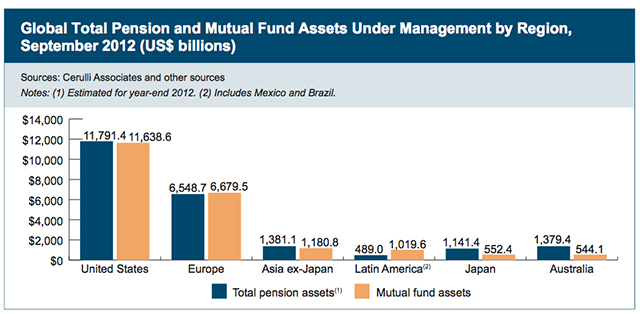
(January 9, 2013) — Asset managers in Asia believe pension funds will be the most profitable segment of their institutional business in 2015, followed by central banks and quasi-government agencies, according to a poll by Cerulli Associates.
The reason stems from the large size of these institutions, as well as their willingness to engage external managers and move into riskier assets, including equities and alternatives.
“Across Asia, instances of fee wars, which sometimes result in zero management fees, are increasingly common; mainly because external managers in markets such as China and Korea will attempt to win institutional assets even if it means incurring a loss,” commented Barbara Wall, a director at the firm. “Managers are often prepared to accept a low fee mandate in the belief that it will open doors to more profitable business.”
Based on talks with European managers, the research company found that marketing and sales efforts were increasingly focused on winning pension mandates. In terms of product launches, diversified growth funds (DGFs) are hitting the mark with consultants and pension funds, the firm noted. While none of the European managers polled by lli plan to increase fees, a significant minority are contemplating fee reductions.
In addition, the firm found that product developers in the United States and Europe already sense the bond bonanza will end shortly. There are notable exceptions, however, as Cerulli added that it expects new short-dated bond funds to appear in both markets to capitalize on investor fears about expected volatility.
Analysts at French bank Societe Generale published a more pessimistic view earlier this month, claiming investors dramatically underestimate a hard landing in China. The bank’s China specialist believes there is a “non-negligible risk” of a hard landing by the world’s second largest economy this year, even though it has slipped down investors’ list of concerns. The Chinese economy is still imbalanced, the bank said, as it relies too heavily on investment to fuel GDP while its net exports have fallen steadily since 2008.
The note said: “More than two thirds of the respondents [to a client survey] believe that in the worst case, Chinese growth would be between 5.5% and 7%…if investment simply stays unchanged, growth will mechanically drop to 4%. The collapse in confidence would further cut growth to 3%. Less than 5% of our survey respondents expect growth to be below 3.5% in the worst reasonable case.”
